Role of Ethics in Modern day Research
VerifiedAdded on 2023/01/16
|10
|3196
|1
AI Summary
This report explores the role of ethics in modern day research and its importance in ensuring the well-being of research participants. It discusses research ethics, standard ethical principles, and the potential harm that research can cause. It also provides an overview of the BERA (2004) and ESRC (2005) Research Ethics Framework.
Contribute Materials
Your contribution can guide someone’s learning journey. Share your
documents today.
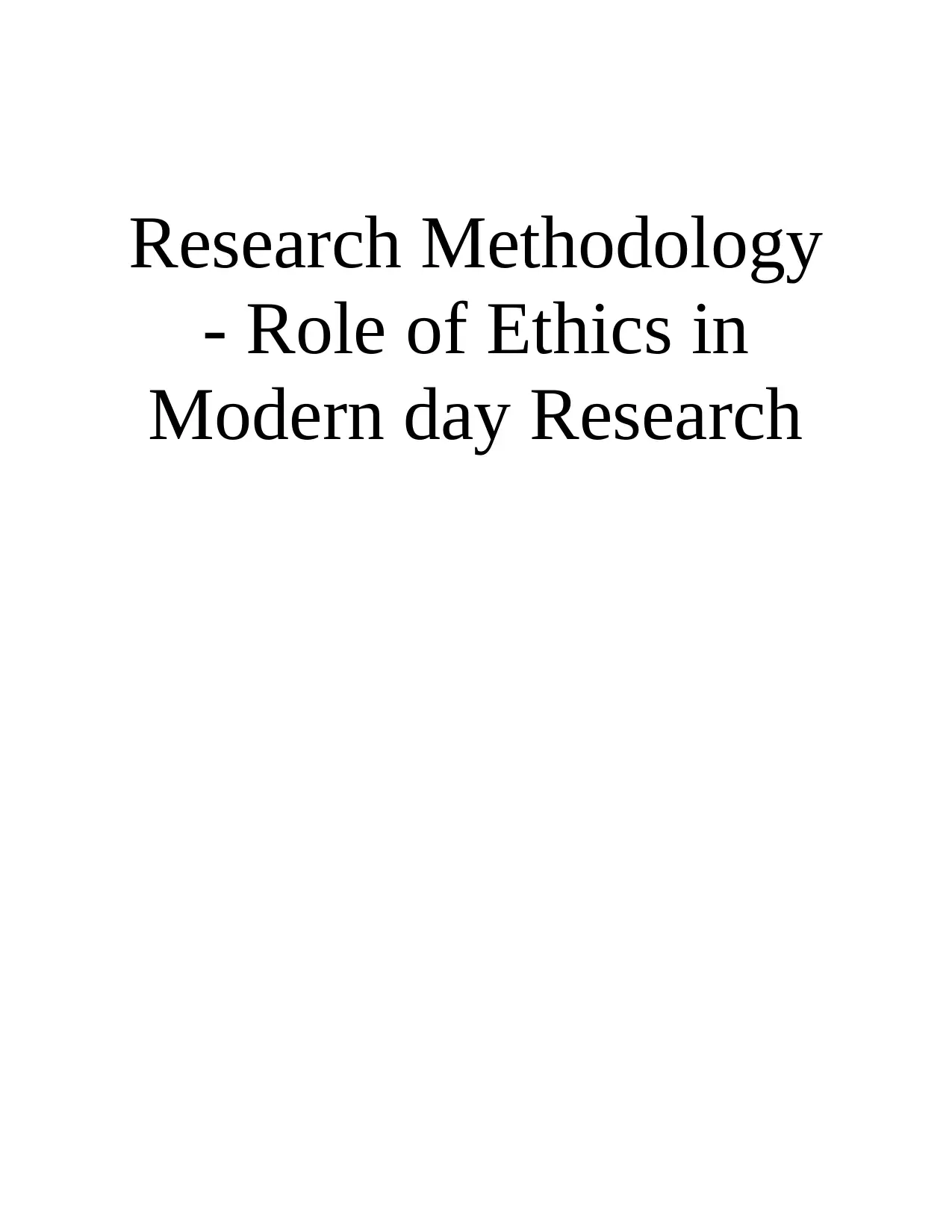
Research Methodology
- Role of Ethics in
Modern day Research
- Role of Ethics in
Modern day Research
Secure Best Marks with AI Grader
Need help grading? Try our AI Grader for instant feedback on your assignments.
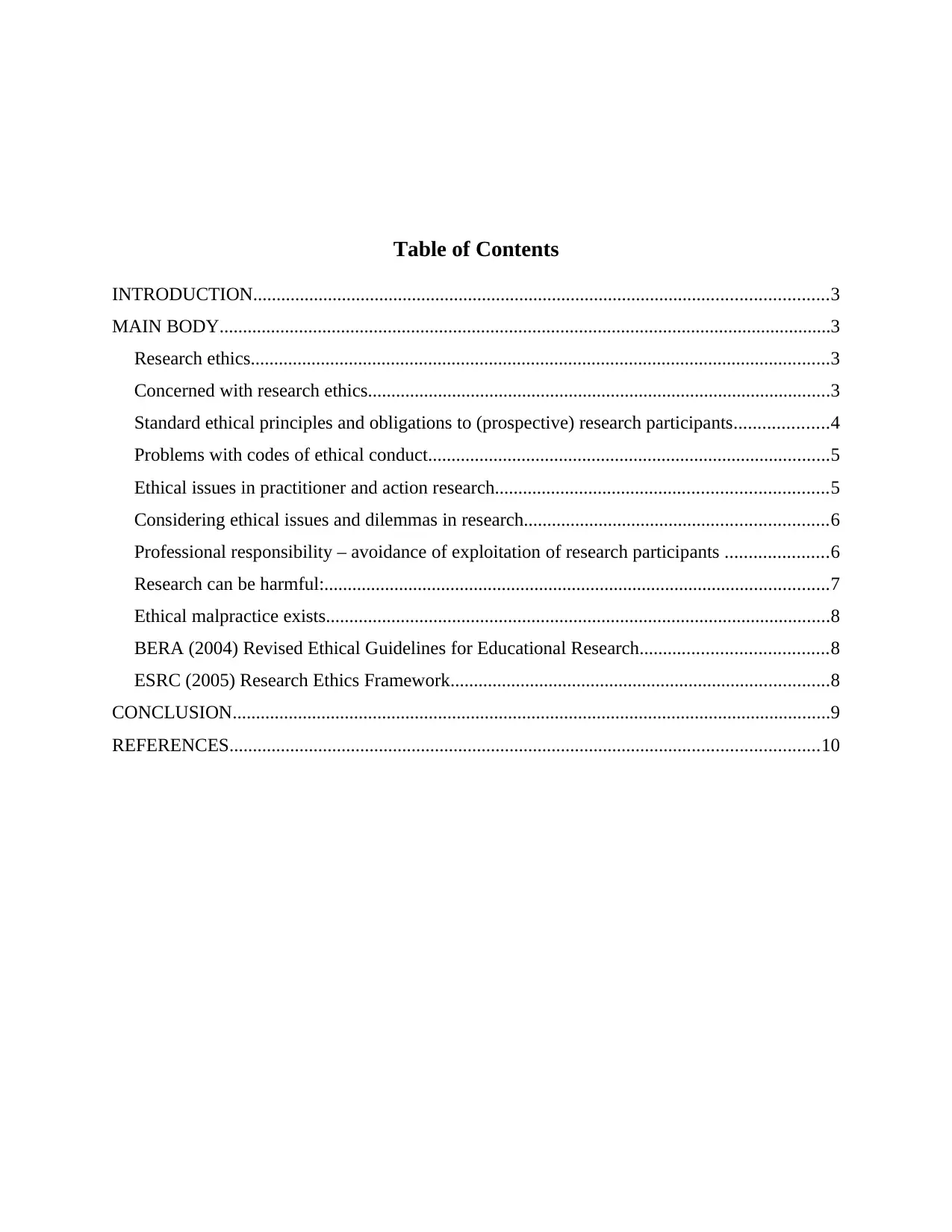
Table of Contents
INTRODUCTION...........................................................................................................................3
MAIN BODY...................................................................................................................................3
Research ethics............................................................................................................................3
Concerned with research ethics...................................................................................................3
Standard ethical principles and obligations to (prospective) research participants....................4
Problems with codes of ethical conduct......................................................................................5
Ethical issues in practitioner and action research.......................................................................5
Considering ethical issues and dilemmas in research.................................................................6
Professional responsibility – avoidance of exploitation of research participants ......................6
Research can be harmful:............................................................................................................7
Ethical malpractice exists............................................................................................................8
BERA (2004) Revised Ethical Guidelines for Educational Research........................................8
ESRC (2005) Research Ethics Framework.................................................................................8
CONCLUSION................................................................................................................................9
REFERENCES..............................................................................................................................10
INTRODUCTION...........................................................................................................................3
MAIN BODY...................................................................................................................................3
Research ethics............................................................................................................................3
Concerned with research ethics...................................................................................................3
Standard ethical principles and obligations to (prospective) research participants....................4
Problems with codes of ethical conduct......................................................................................5
Ethical issues in practitioner and action research.......................................................................5
Considering ethical issues and dilemmas in research.................................................................6
Professional responsibility – avoidance of exploitation of research participants ......................6
Research can be harmful:............................................................................................................7
Ethical malpractice exists............................................................................................................8
BERA (2004) Revised Ethical Guidelines for Educational Research........................................8
ESRC (2005) Research Ethics Framework.................................................................................8
CONCLUSION................................................................................................................................9
REFERENCES..............................................................................................................................10
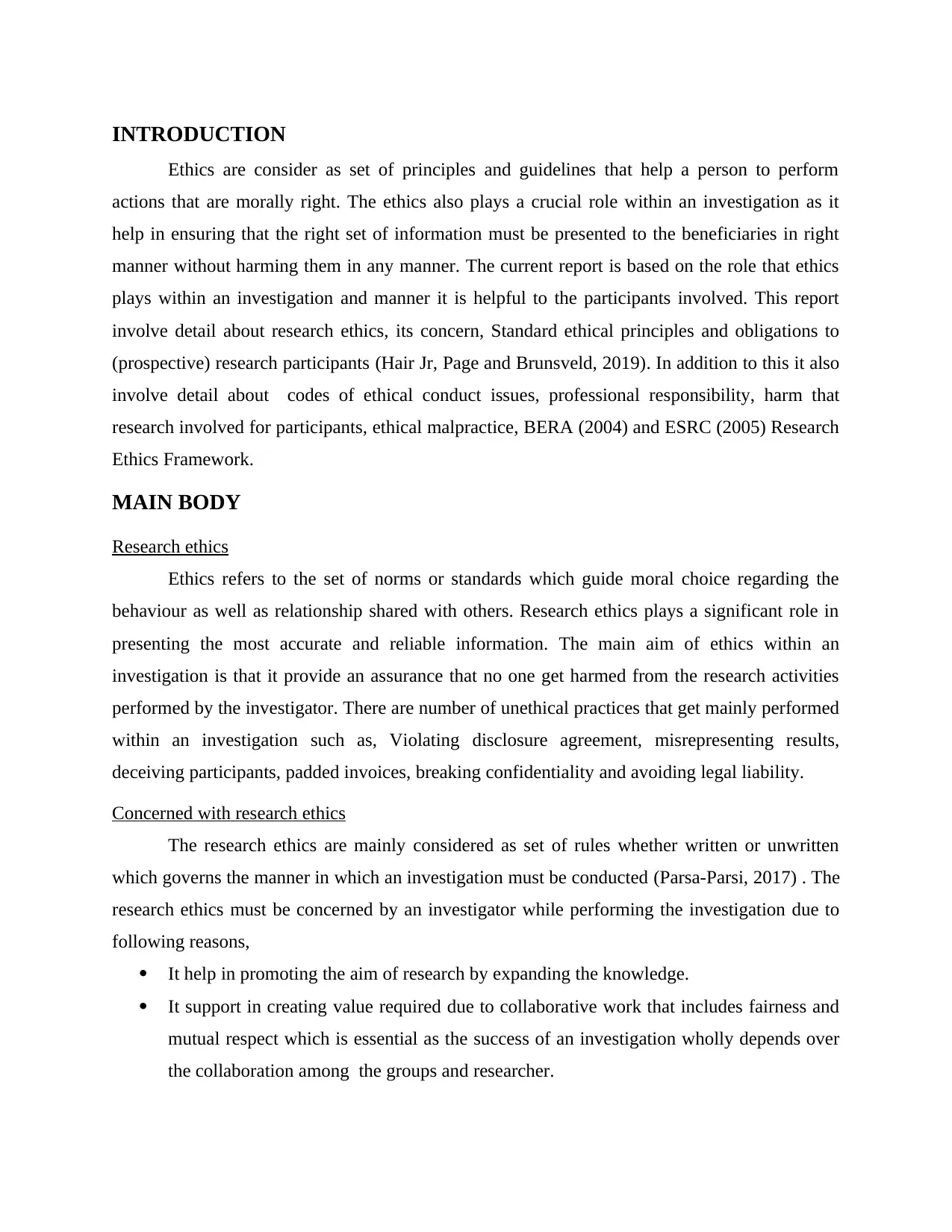
INTRODUCTION
Ethics are consider as set of principles and guidelines that help a person to perform
actions that are morally right. The ethics also plays a crucial role within an investigation as it
help in ensuring that the right set of information must be presented to the beneficiaries in right
manner without harming them in any manner. The current report is based on the role that ethics
plays within an investigation and manner it is helpful to the participants involved. This report
involve detail about research ethics, its concern, Standard ethical principles and obligations to
(prospective) research participants (Hair Jr, Page and Brunsveld, 2019). In addition to this it also
involve detail about codes of ethical conduct issues, professional responsibility, harm that
research involved for participants, ethical malpractice, BERA (2004) and ESRC (2005) Research
Ethics Framework.
MAIN BODY
Research ethics
Ethics refers to the set of norms or standards which guide moral choice regarding the
behaviour as well as relationship shared with others. Research ethics plays a significant role in
presenting the most accurate and reliable information. The main aim of ethics within an
investigation is that it provide an assurance that no one get harmed from the research activities
performed by the investigator. There are number of unethical practices that get mainly performed
within an investigation such as, Violating disclosure agreement, misrepresenting results,
deceiving participants, padded invoices, breaking confidentiality and avoiding legal liability.
Concerned with research ethics
The research ethics are mainly considered as set of rules whether written or unwritten
which governs the manner in which an investigation must be conducted (Parsa-Parsi, 2017) . The
research ethics must be concerned by an investigator while performing the investigation due to
following reasons,
It help in promoting the aim of research by expanding the knowledge.
It support in creating value required due to collaborative work that includes fairness and
mutual respect which is essential as the success of an investigation wholly depends over
the collaboration among the groups and researcher.
Ethics are consider as set of principles and guidelines that help a person to perform
actions that are morally right. The ethics also plays a crucial role within an investigation as it
help in ensuring that the right set of information must be presented to the beneficiaries in right
manner without harming them in any manner. The current report is based on the role that ethics
plays within an investigation and manner it is helpful to the participants involved. This report
involve detail about research ethics, its concern, Standard ethical principles and obligations to
(prospective) research participants (Hair Jr, Page and Brunsveld, 2019). In addition to this it also
involve detail about codes of ethical conduct issues, professional responsibility, harm that
research involved for participants, ethical malpractice, BERA (2004) and ESRC (2005) Research
Ethics Framework.
MAIN BODY
Research ethics
Ethics refers to the set of norms or standards which guide moral choice regarding the
behaviour as well as relationship shared with others. Research ethics plays a significant role in
presenting the most accurate and reliable information. The main aim of ethics within an
investigation is that it provide an assurance that no one get harmed from the research activities
performed by the investigator. There are number of unethical practices that get mainly performed
within an investigation such as, Violating disclosure agreement, misrepresenting results,
deceiving participants, padded invoices, breaking confidentiality and avoiding legal liability.
Concerned with research ethics
The research ethics are mainly considered as set of rules whether written or unwritten
which governs the manner in which an investigation must be conducted (Parsa-Parsi, 2017) . The
research ethics must be concerned by an investigator while performing the investigation due to
following reasons,
It help in promoting the aim of research by expanding the knowledge.
It support in creating value required due to collaborative work that includes fairness and
mutual respect which is essential as the success of an investigation wholly depends over
the collaboration among the groups and researcher.
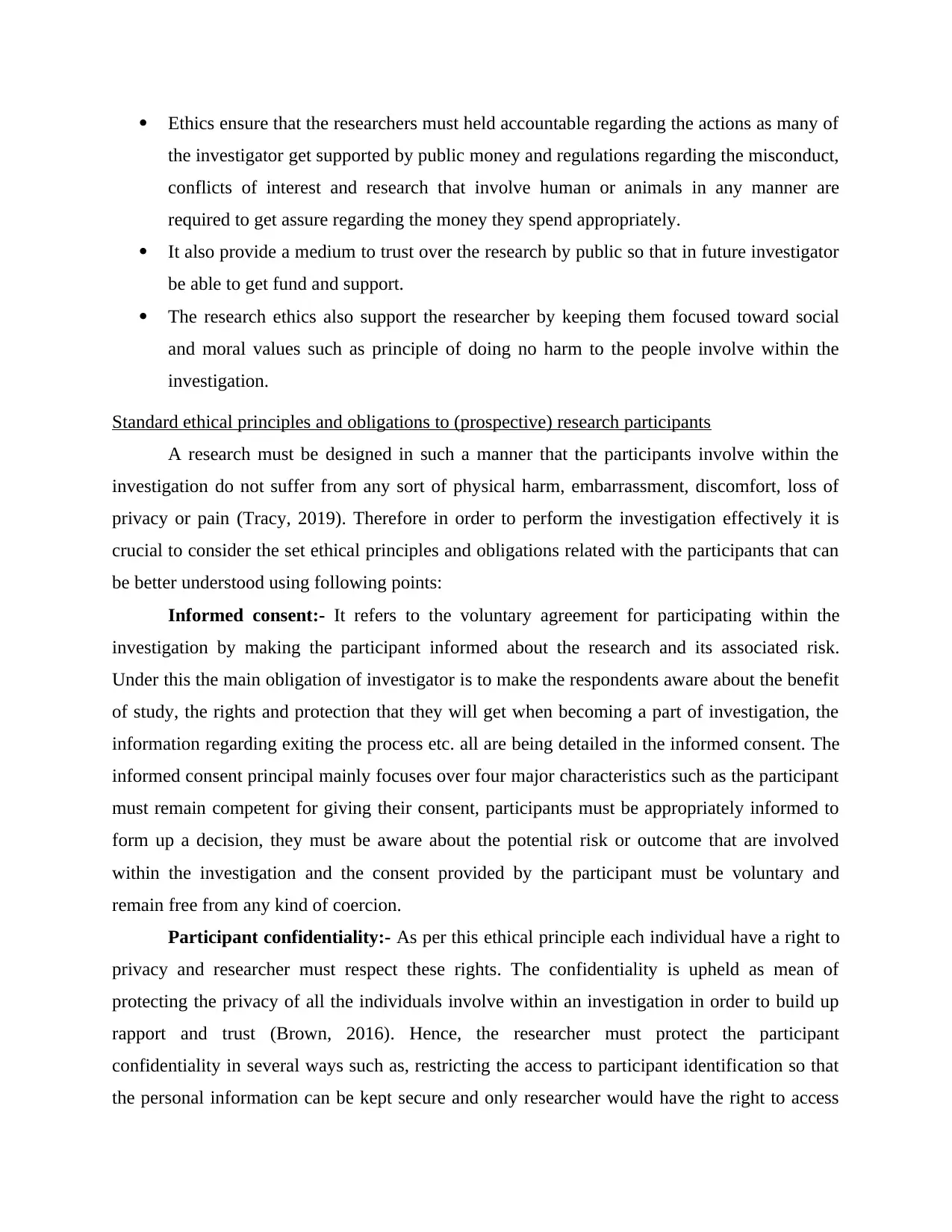
Ethics ensure that the researchers must held accountable regarding the actions as many of
the investigator get supported by public money and regulations regarding the misconduct,
conflicts of interest and research that involve human or animals in any manner are
required to get assure regarding the money they spend appropriately.
It also provide a medium to trust over the research by public so that in future investigator
be able to get fund and support.
The research ethics also support the researcher by keeping them focused toward social
and moral values such as principle of doing no harm to the people involve within the
investigation.
Standard ethical principles and obligations to (prospective) research participants
A research must be designed in such a manner that the participants involve within the
investigation do not suffer from any sort of physical harm, embarrassment, discomfort, loss of
privacy or pain (Tracy, 2019). Therefore in order to perform the investigation effectively it is
crucial to consider the set ethical principles and obligations related with the participants that can
be better understood using following points:
Informed consent:- It refers to the voluntary agreement for participating within the
investigation by making the participant informed about the research and its associated risk.
Under this the main obligation of investigator is to make the respondents aware about the benefit
of study, the rights and protection that they will get when becoming a part of investigation, the
information regarding exiting the process etc. all are being detailed in the informed consent. The
informed consent principal mainly focuses over four major characteristics such as the participant
must remain competent for giving their consent, participants must be appropriately informed to
form up a decision, they must be aware about the potential risk or outcome that are involved
within the investigation and the consent provided by the participant must be voluntary and
remain free from any kind of coercion.
Participant confidentiality:- As per this ethical principle each individual have a right to
privacy and researcher must respect these rights. The confidentiality is upheld as mean of
protecting the privacy of all the individuals involve within an investigation in order to build up
rapport and trust (Brown, 2016). Hence, the researcher must protect the participant
confidentiality in several ways such as, restricting the access to participant identification so that
the personal information can be kept secure and only researcher would have the right to access
the investigator get supported by public money and regulations regarding the misconduct,
conflicts of interest and research that involve human or animals in any manner are
required to get assure regarding the money they spend appropriately.
It also provide a medium to trust over the research by public so that in future investigator
be able to get fund and support.
The research ethics also support the researcher by keeping them focused toward social
and moral values such as principle of doing no harm to the people involve within the
investigation.
Standard ethical principles and obligations to (prospective) research participants
A research must be designed in such a manner that the participants involve within the
investigation do not suffer from any sort of physical harm, embarrassment, discomfort, loss of
privacy or pain (Tracy, 2019). Therefore in order to perform the investigation effectively it is
crucial to consider the set ethical principles and obligations related with the participants that can
be better understood using following points:
Informed consent:- It refers to the voluntary agreement for participating within the
investigation by making the participant informed about the research and its associated risk.
Under this the main obligation of investigator is to make the respondents aware about the benefit
of study, the rights and protection that they will get when becoming a part of investigation, the
information regarding exiting the process etc. all are being detailed in the informed consent. The
informed consent principal mainly focuses over four major characteristics such as the participant
must remain competent for giving their consent, participants must be appropriately informed to
form up a decision, they must be aware about the potential risk or outcome that are involved
within the investigation and the consent provided by the participant must be voluntary and
remain free from any kind of coercion.
Participant confidentiality:- As per this ethical principle each individual have a right to
privacy and researcher must respect these rights. The confidentiality is upheld as mean of
protecting the privacy of all the individuals involve within an investigation in order to build up
rapport and trust (Brown, 2016). Hence, the researcher must protect the participant
confidentiality in several ways such as, restricting the access to participant identification so that
the personal information can be kept secure and only researcher would have the right to access
Secure Best Marks with AI Grader
Need help grading? Try our AI Grader for instant feedback on your assignments.
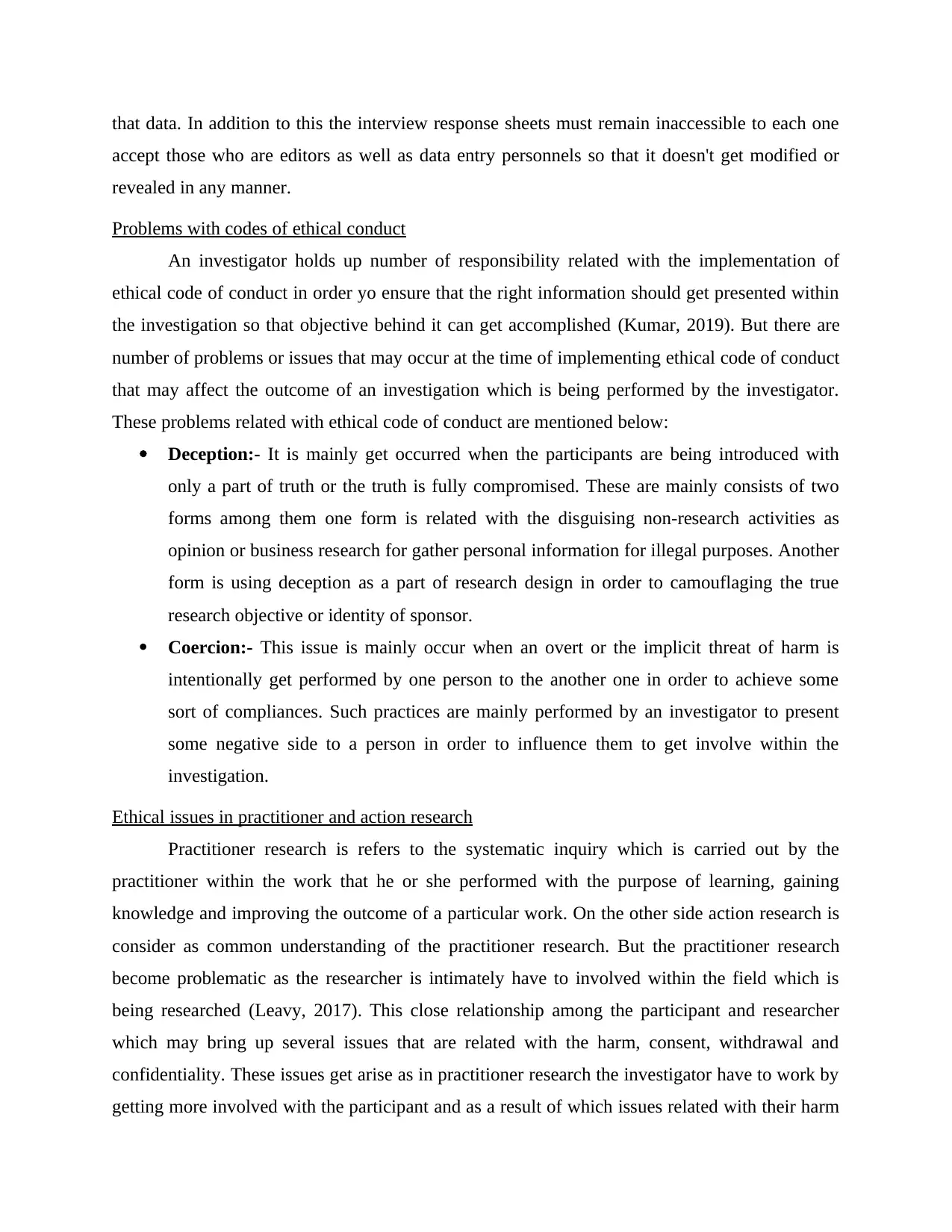
that data. In addition to this the interview response sheets must remain inaccessible to each one
accept those who are editors as well as data entry personnels so that it doesn't get modified or
revealed in any manner.
Problems with codes of ethical conduct
An investigator holds up number of responsibility related with the implementation of
ethical code of conduct in order yo ensure that the right information should get presented within
the investigation so that objective behind it can get accomplished (Kumar, 2019). But there are
number of problems or issues that may occur at the time of implementing ethical code of conduct
that may affect the outcome of an investigation which is being performed by the investigator.
These problems related with ethical code of conduct are mentioned below:
Deception:- It is mainly get occurred when the participants are being introduced with
only a part of truth or the truth is fully compromised. These are mainly consists of two
forms among them one form is related with the disguising non-research activities as
opinion or business research for gather personal information for illegal purposes. Another
form is using deception as a part of research design in order to camouflaging the true
research objective or identity of sponsor.
Coercion:- This issue is mainly occur when an overt or the implicit threat of harm is
intentionally get performed by one person to the another one in order to achieve some
sort of compliances. Such practices are mainly performed by an investigator to present
some negative side to a person in order to influence them to get involve within the
investigation.
Ethical issues in practitioner and action research
Practitioner research is refers to the systematic inquiry which is carried out by the
practitioner within the work that he or she performed with the purpose of learning, gaining
knowledge and improving the outcome of a particular work. On the other side action research is
consider as common understanding of the practitioner research. But the practitioner research
become problematic as the researcher is intimately have to involved within the field which is
being researched (Leavy, 2017). This close relationship among the participant and researcher
which may bring up several issues that are related with the harm, consent, withdrawal and
confidentiality. These issues get arise as in practitioner research the investigator have to work by
getting more involved with the participant and as a result of which issues related with their harm
accept those who are editors as well as data entry personnels so that it doesn't get modified or
revealed in any manner.
Problems with codes of ethical conduct
An investigator holds up number of responsibility related with the implementation of
ethical code of conduct in order yo ensure that the right information should get presented within
the investigation so that objective behind it can get accomplished (Kumar, 2019). But there are
number of problems or issues that may occur at the time of implementing ethical code of conduct
that may affect the outcome of an investigation which is being performed by the investigator.
These problems related with ethical code of conduct are mentioned below:
Deception:- It is mainly get occurred when the participants are being introduced with
only a part of truth or the truth is fully compromised. These are mainly consists of two
forms among them one form is related with the disguising non-research activities as
opinion or business research for gather personal information for illegal purposes. Another
form is using deception as a part of research design in order to camouflaging the true
research objective or identity of sponsor.
Coercion:- This issue is mainly occur when an overt or the implicit threat of harm is
intentionally get performed by one person to the another one in order to achieve some
sort of compliances. Such practices are mainly performed by an investigator to present
some negative side to a person in order to influence them to get involve within the
investigation.
Ethical issues in practitioner and action research
Practitioner research is refers to the systematic inquiry which is carried out by the
practitioner within the work that he or she performed with the purpose of learning, gaining
knowledge and improving the outcome of a particular work. On the other side action research is
consider as common understanding of the practitioner research. But the practitioner research
become problematic as the researcher is intimately have to involved within the field which is
being researched (Leavy, 2017). This close relationship among the participant and researcher
which may bring up several issues that are related with the harm, consent, withdrawal and
confidentiality. These issues get arise as in practitioner research the investigator have to work by
getting more involved with the participant and as a result of which issues related with their harm
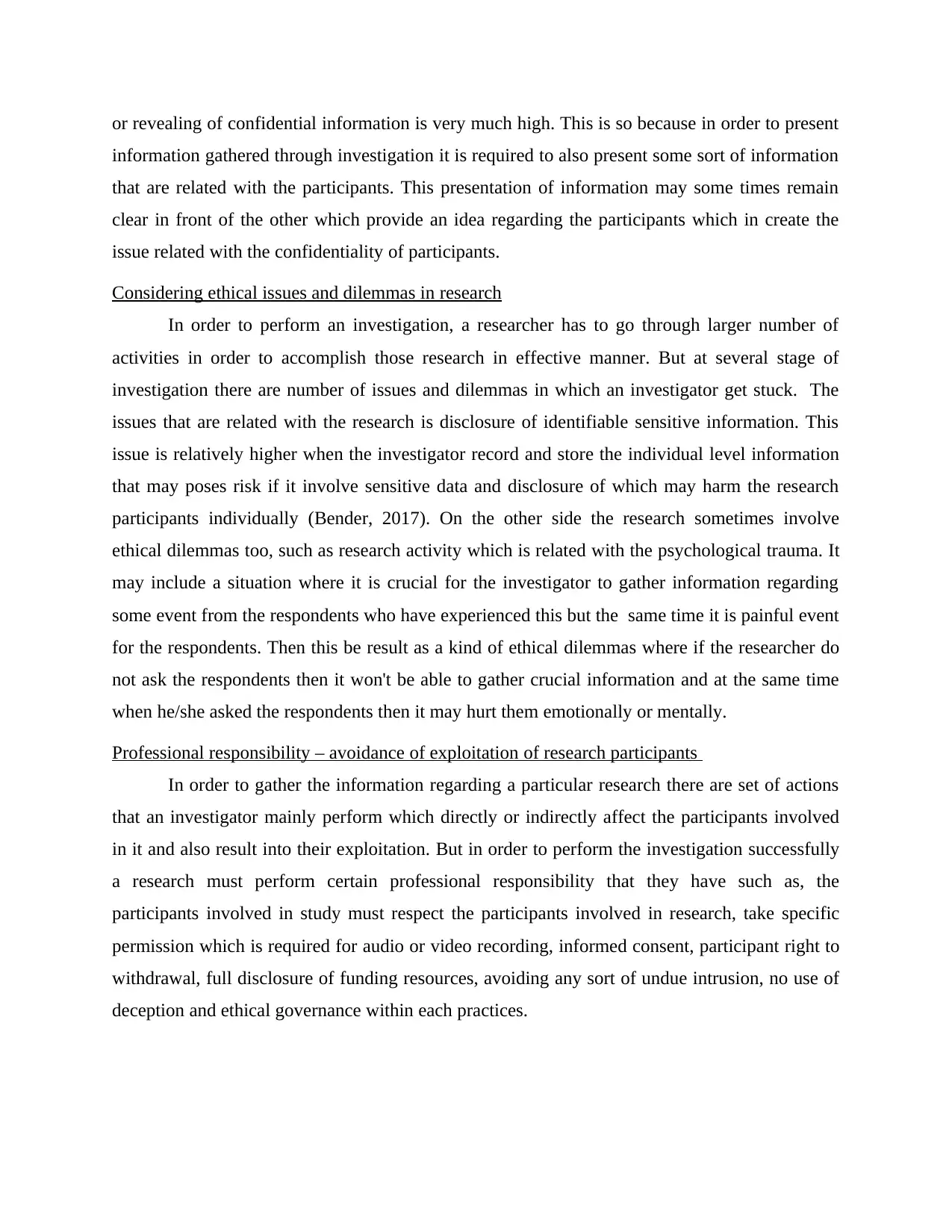
or revealing of confidential information is very much high. This is so because in order to present
information gathered through investigation it is required to also present some sort of information
that are related with the participants. This presentation of information may some times remain
clear in front of the other which provide an idea regarding the participants which in create the
issue related with the confidentiality of participants.
Considering ethical issues and dilemmas in research
In order to perform an investigation, a researcher has to go through larger number of
activities in order to accomplish those research in effective manner. But at several stage of
investigation there are number of issues and dilemmas in which an investigator get stuck. The
issues that are related with the research is disclosure of identifiable sensitive information. This
issue is relatively higher when the investigator record and store the individual level information
that may poses risk if it involve sensitive data and disclosure of which may harm the research
participants individually (Bender, 2017). On the other side the research sometimes involve
ethical dilemmas too, such as research activity which is related with the psychological trauma. It
may include a situation where it is crucial for the investigator to gather information regarding
some event from the respondents who have experienced this but the same time it is painful event
for the respondents. Then this be result as a kind of ethical dilemmas where if the researcher do
not ask the respondents then it won't be able to gather crucial information and at the same time
when he/she asked the respondents then it may hurt them emotionally or mentally.
Professional responsibility – avoidance of exploitation of research participants
In order to gather the information regarding a particular research there are set of actions
that an investigator mainly perform which directly or indirectly affect the participants involved
in it and also result into their exploitation. But in order to perform the investigation successfully
a research must perform certain professional responsibility that they have such as, the
participants involved in study must respect the participants involved in research, take specific
permission which is required for audio or video recording, informed consent, participant right to
withdrawal, full disclosure of funding resources, avoiding any sort of undue intrusion, no use of
deception and ethical governance within each practices.
information gathered through investigation it is required to also present some sort of information
that are related with the participants. This presentation of information may some times remain
clear in front of the other which provide an idea regarding the participants which in create the
issue related with the confidentiality of participants.
Considering ethical issues and dilemmas in research
In order to perform an investigation, a researcher has to go through larger number of
activities in order to accomplish those research in effective manner. But at several stage of
investigation there are number of issues and dilemmas in which an investigator get stuck. The
issues that are related with the research is disclosure of identifiable sensitive information. This
issue is relatively higher when the investigator record and store the individual level information
that may poses risk if it involve sensitive data and disclosure of which may harm the research
participants individually (Bender, 2017). On the other side the research sometimes involve
ethical dilemmas too, such as research activity which is related with the psychological trauma. It
may include a situation where it is crucial for the investigator to gather information regarding
some event from the respondents who have experienced this but the same time it is painful event
for the respondents. Then this be result as a kind of ethical dilemmas where if the researcher do
not ask the respondents then it won't be able to gather crucial information and at the same time
when he/she asked the respondents then it may hurt them emotionally or mentally.
Professional responsibility – avoidance of exploitation of research participants
In order to gather the information regarding a particular research there are set of actions
that an investigator mainly perform which directly or indirectly affect the participants involved
in it and also result into their exploitation. But in order to perform the investigation successfully
a research must perform certain professional responsibility that they have such as, the
participants involved in study must respect the participants involved in research, take specific
permission which is required for audio or video recording, informed consent, participant right to
withdrawal, full disclosure of funding resources, avoiding any sort of undue intrusion, no use of
deception and ethical governance within each practices.
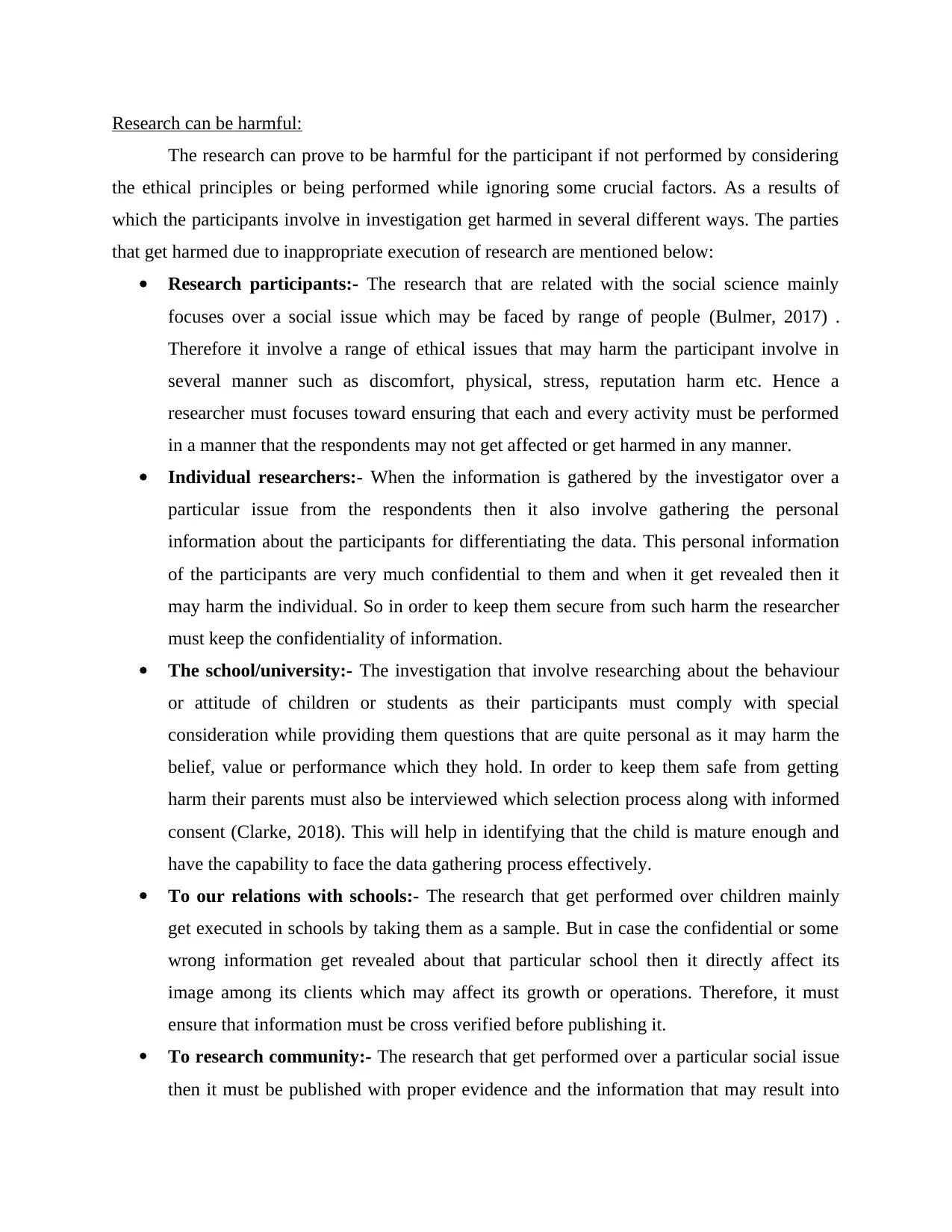
Research can be harmful:
The research can prove to be harmful for the participant if not performed by considering
the ethical principles or being performed while ignoring some crucial factors. As a results of
which the participants involve in investigation get harmed in several different ways. The parties
that get harmed due to inappropriate execution of research are mentioned below:
Research participants:- The research that are related with the social science mainly
focuses over a social issue which may be faced by range of people (Bulmer, 2017) .
Therefore it involve a range of ethical issues that may harm the participant involve in
several manner such as discomfort, physical, stress, reputation harm etc. Hence a
researcher must focuses toward ensuring that each and every activity must be performed
in a manner that the respondents may not get affected or get harmed in any manner.
Individual researchers:- When the information is gathered by the investigator over a
particular issue from the respondents then it also involve gathering the personal
information about the participants for differentiating the data. This personal information
of the participants are very much confidential to them and when it get revealed then it
may harm the individual. So in order to keep them secure from such harm the researcher
must keep the confidentiality of information.
The school/university:- The investigation that involve researching about the behaviour
or attitude of children or students as their participants must comply with special
consideration while providing them questions that are quite personal as it may harm the
belief, value or performance which they hold. In order to keep them safe from getting
harm their parents must also be interviewed which selection process along with informed
consent (Clarke, 2018). This will help in identifying that the child is mature enough and
have the capability to face the data gathering process effectively.
To our relations with schools:- The research that get performed over children mainly
get executed in schools by taking them as a sample. But in case the confidential or some
wrong information get revealed about that particular school then it directly affect its
image among its clients which may affect its growth or operations. Therefore, it must
ensure that information must be cross verified before publishing it.
To research community:- The research that get performed over a particular social issue
then it must be published with proper evidence and the information that may result into
The research can prove to be harmful for the participant if not performed by considering
the ethical principles or being performed while ignoring some crucial factors. As a results of
which the participants involve in investigation get harmed in several different ways. The parties
that get harmed due to inappropriate execution of research are mentioned below:
Research participants:- The research that are related with the social science mainly
focuses over a social issue which may be faced by range of people (Bulmer, 2017) .
Therefore it involve a range of ethical issues that may harm the participant involve in
several manner such as discomfort, physical, stress, reputation harm etc. Hence a
researcher must focuses toward ensuring that each and every activity must be performed
in a manner that the respondents may not get affected or get harmed in any manner.
Individual researchers:- When the information is gathered by the investigator over a
particular issue from the respondents then it also involve gathering the personal
information about the participants for differentiating the data. This personal information
of the participants are very much confidential to them and when it get revealed then it
may harm the individual. So in order to keep them secure from such harm the researcher
must keep the confidentiality of information.
The school/university:- The investigation that involve researching about the behaviour
or attitude of children or students as their participants must comply with special
consideration while providing them questions that are quite personal as it may harm the
belief, value or performance which they hold. In order to keep them safe from getting
harm their parents must also be interviewed which selection process along with informed
consent (Clarke, 2018). This will help in identifying that the child is mature enough and
have the capability to face the data gathering process effectively.
To our relations with schools:- The research that get performed over children mainly
get executed in schools by taking them as a sample. But in case the confidential or some
wrong information get revealed about that particular school then it directly affect its
image among its clients which may affect its growth or operations. Therefore, it must
ensure that information must be cross verified before publishing it.
To research community:- The research that get performed over a particular social issue
then it must be published with proper evidence and the information that may result into
Paraphrase This Document
Need a fresh take? Get an instant paraphrase of this document with our AI Paraphraser
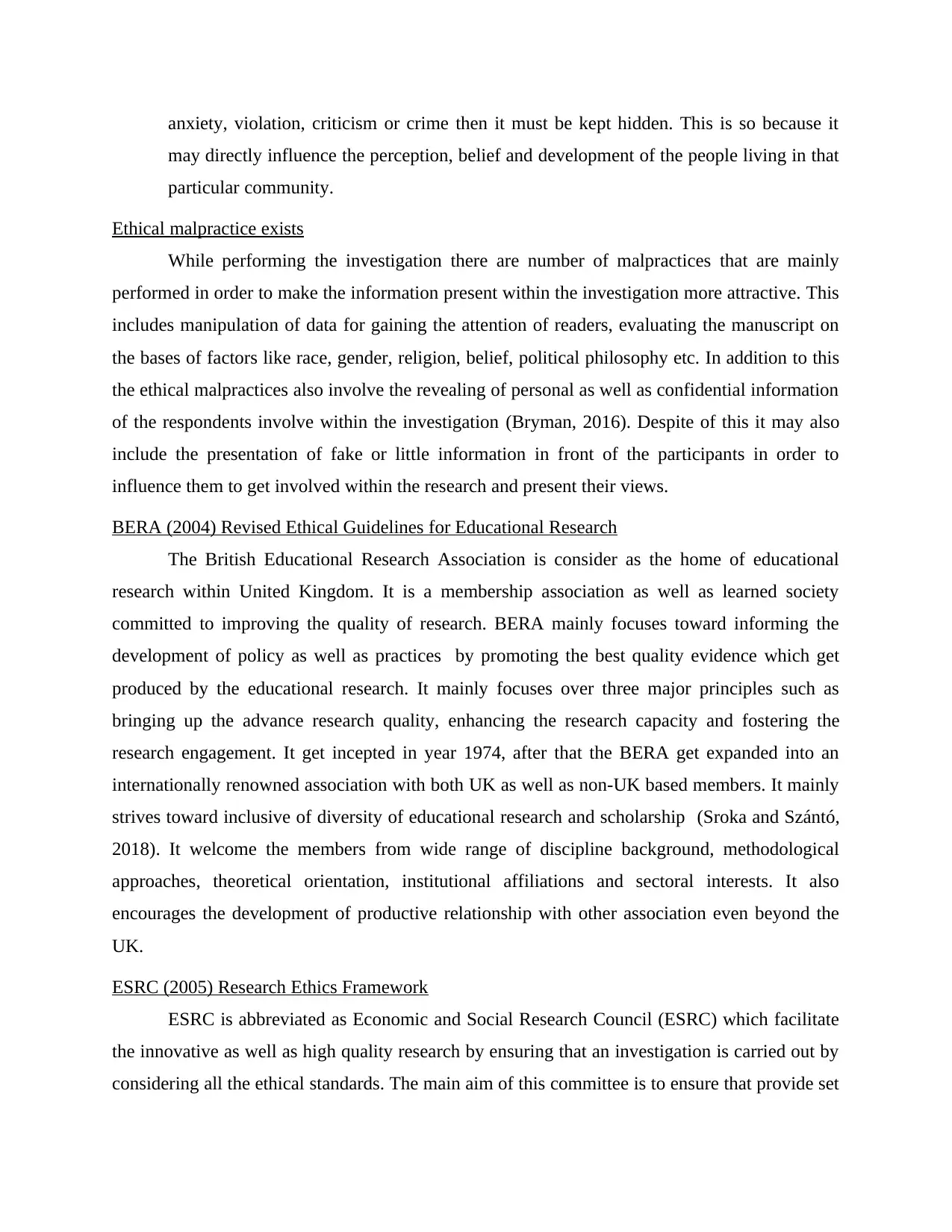
anxiety, violation, criticism or crime then it must be kept hidden. This is so because it
may directly influence the perception, belief and development of the people living in that
particular community.
Ethical malpractice exists
While performing the investigation there are number of malpractices that are mainly
performed in order to make the information present within the investigation more attractive. This
includes manipulation of data for gaining the attention of readers, evaluating the manuscript on
the bases of factors like race, gender, religion, belief, political philosophy etc. In addition to this
the ethical malpractices also involve the revealing of personal as well as confidential information
of the respondents involve within the investigation (Bryman, 2016). Despite of this it may also
include the presentation of fake or little information in front of the participants in order to
influence them to get involved within the research and present their views.
BERA (2004) Revised Ethical Guidelines for Educational Research
The British Educational Research Association is consider as the home of educational
research within United Kingdom. It is a membership association as well as learned society
committed to improving the quality of research. BERA mainly focuses toward informing the
development of policy as well as practices by promoting the best quality evidence which get
produced by the educational research. It mainly focuses over three major principles such as
bringing up the advance research quality, enhancing the research capacity and fostering the
research engagement. It get incepted in year 1974, after that the BERA get expanded into an
internationally renowned association with both UK as well as non-UK based members. It mainly
strives toward inclusive of diversity of educational research and scholarship (Sroka and Szántó,
2018). It welcome the members from wide range of discipline background, methodological
approaches, theoretical orientation, institutional affiliations and sectoral interests. It also
encourages the development of productive relationship with other association even beyond the
UK.
ESRC (2005) Research Ethics Framework
ESRC is abbreviated as Economic and Social Research Council (ESRC) which facilitate
the innovative as well as high quality research by ensuring that an investigation is carried out by
considering all the ethical standards. The main aim of this committee is to ensure that provide set
may directly influence the perception, belief and development of the people living in that
particular community.
Ethical malpractice exists
While performing the investigation there are number of malpractices that are mainly
performed in order to make the information present within the investigation more attractive. This
includes manipulation of data for gaining the attention of readers, evaluating the manuscript on
the bases of factors like race, gender, religion, belief, political philosophy etc. In addition to this
the ethical malpractices also involve the revealing of personal as well as confidential information
of the respondents involve within the investigation (Bryman, 2016). Despite of this it may also
include the presentation of fake or little information in front of the participants in order to
influence them to get involved within the research and present their views.
BERA (2004) Revised Ethical Guidelines for Educational Research
The British Educational Research Association is consider as the home of educational
research within United Kingdom. It is a membership association as well as learned society
committed to improving the quality of research. BERA mainly focuses toward informing the
development of policy as well as practices by promoting the best quality evidence which get
produced by the educational research. It mainly focuses over three major principles such as
bringing up the advance research quality, enhancing the research capacity and fostering the
research engagement. It get incepted in year 1974, after that the BERA get expanded into an
internationally renowned association with both UK as well as non-UK based members. It mainly
strives toward inclusive of diversity of educational research and scholarship (Sroka and Szántó,
2018). It welcome the members from wide range of discipline background, methodological
approaches, theoretical orientation, institutional affiliations and sectoral interests. It also
encourages the development of productive relationship with other association even beyond the
UK.
ESRC (2005) Research Ethics Framework
ESRC is abbreviated as Economic and Social Research Council (ESRC) which facilitate
the innovative as well as high quality research by ensuring that an investigation is carried out by
considering all the ethical standards. The main aim of this committee is to ensure that provide set
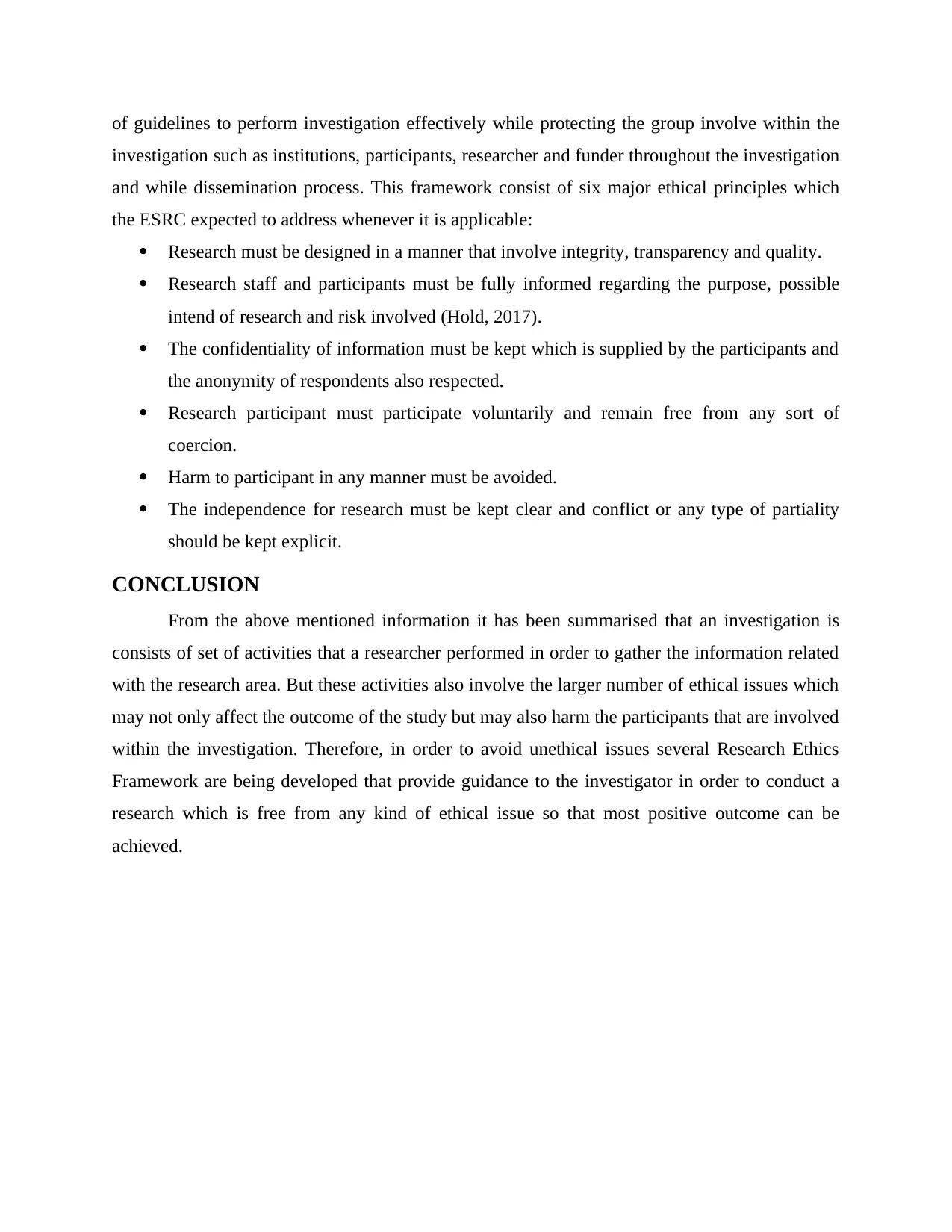
of guidelines to perform investigation effectively while protecting the group involve within the
investigation such as institutions, participants, researcher and funder throughout the investigation
and while dissemination process. This framework consist of six major ethical principles which
the ESRC expected to address whenever it is applicable:
Research must be designed in a manner that involve integrity, transparency and quality.
Research staff and participants must be fully informed regarding the purpose, possible
intend of research and risk involved (Hold, 2017).
The confidentiality of information must be kept which is supplied by the participants and
the anonymity of respondents also respected.
Research participant must participate voluntarily and remain free from any sort of
coercion.
Harm to participant in any manner must be avoided.
The independence for research must be kept clear and conflict or any type of partiality
should be kept explicit.
CONCLUSION
From the above mentioned information it has been summarised that an investigation is
consists of set of activities that a researcher performed in order to gather the information related
with the research area. But these activities also involve the larger number of ethical issues which
may not only affect the outcome of the study but may also harm the participants that are involved
within the investigation. Therefore, in order to avoid unethical issues several Research Ethics
Framework are being developed that provide guidance to the investigator in order to conduct a
research which is free from any kind of ethical issue so that most positive outcome can be
achieved.
investigation such as institutions, participants, researcher and funder throughout the investigation
and while dissemination process. This framework consist of six major ethical principles which
the ESRC expected to address whenever it is applicable:
Research must be designed in a manner that involve integrity, transparency and quality.
Research staff and participants must be fully informed regarding the purpose, possible
intend of research and risk involved (Hold, 2017).
The confidentiality of information must be kept which is supplied by the participants and
the anonymity of respondents also respected.
Research participant must participate voluntarily and remain free from any sort of
coercion.
Harm to participant in any manner must be avoided.
The independence for research must be kept clear and conflict or any type of partiality
should be kept explicit.
CONCLUSION
From the above mentioned information it has been summarised that an investigation is
consists of set of activities that a researcher performed in order to gather the information related
with the research area. But these activities also involve the larger number of ethical issues which
may not only affect the outcome of the study but may also harm the participants that are involved
within the investigation. Therefore, in order to avoid unethical issues several Research Ethics
Framework are being developed that provide guidance to the investigator in order to conduct a
research which is free from any kind of ethical issue so that most positive outcome can be
achieved.
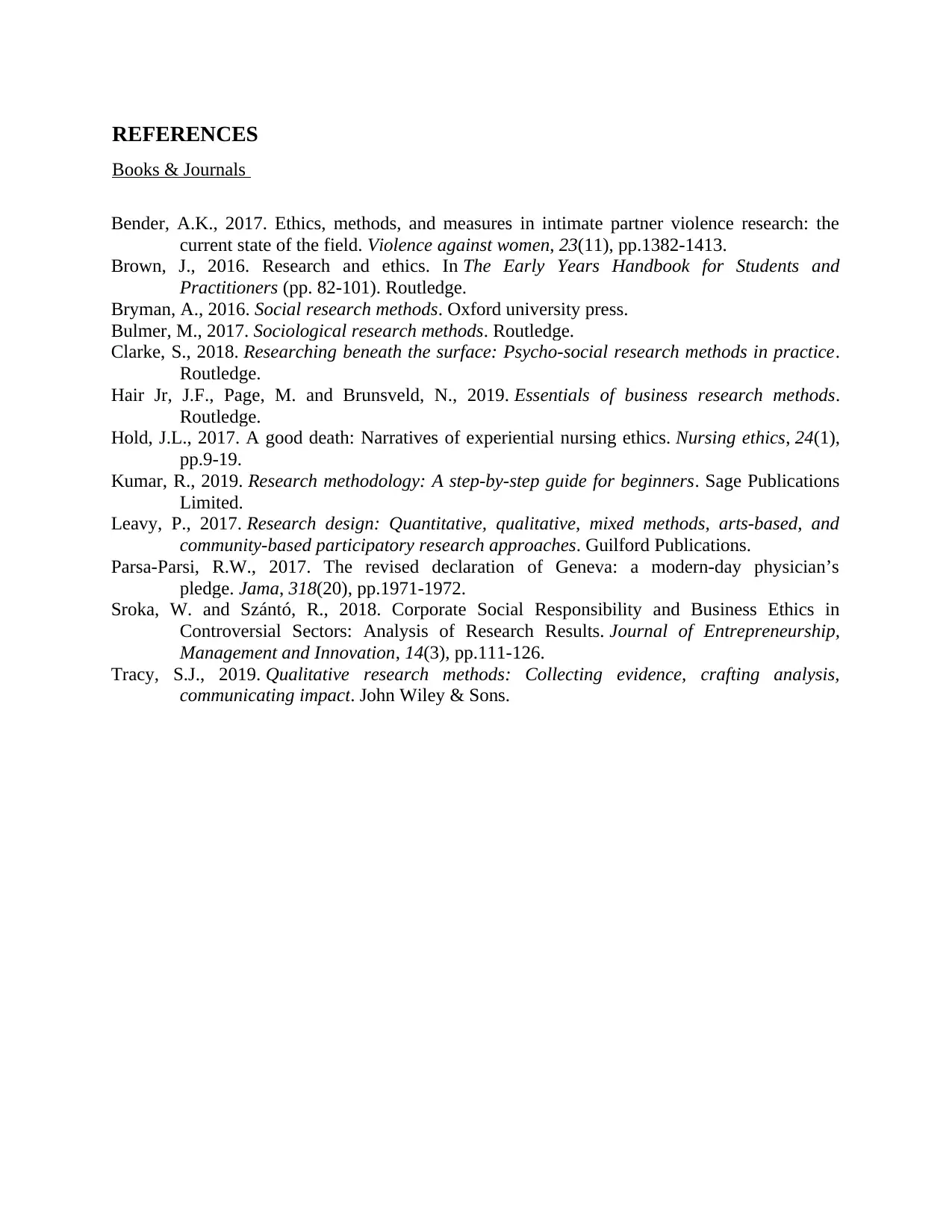
REFERENCES
Books & Journals
Bender, A.K., 2017. Ethics, methods, and measures in intimate partner violence research: the
current state of the field. Violence against women, 23(11), pp.1382-1413.
Brown, J., 2016. Research and ethics. In The Early Years Handbook for Students and
Practitioners (pp. 82-101). Routledge.
Bryman, A., 2016. Social research methods. Oxford university press.
Bulmer, M., 2017. Sociological research methods. Routledge.
Clarke, S., 2018. Researching beneath the surface: Psycho-social research methods in practice.
Routledge.
Hair Jr, J.F., Page, M. and Brunsveld, N., 2019. Essentials of business research methods.
Routledge.
Hold, J.L., 2017. A good death: Narratives of experiential nursing ethics. Nursing ethics, 24(1),
pp.9-19.
Kumar, R., 2019. Research methodology: A step-by-step guide for beginners. Sage Publications
Limited.
Leavy, P., 2017. Research design: Quantitative, qualitative, mixed methods, arts-based, and
community-based participatory research approaches. Guilford Publications.
Parsa-Parsi, R.W., 2017. The revised declaration of Geneva: a modern-day physician’s
pledge. Jama, 318(20), pp.1971-1972.
Sroka, W. and Szántó, R., 2018. Corporate Social Responsibility and Business Ethics in
Controversial Sectors: Analysis of Research Results. Journal of Entrepreneurship,
Management and Innovation, 14(3), pp.111-126.
Tracy, S.J., 2019. Qualitative research methods: Collecting evidence, crafting analysis,
communicating impact. John Wiley & Sons.
Books & Journals
Bender, A.K., 2017. Ethics, methods, and measures in intimate partner violence research: the
current state of the field. Violence against women, 23(11), pp.1382-1413.
Brown, J., 2016. Research and ethics. In The Early Years Handbook for Students and
Practitioners (pp. 82-101). Routledge.
Bryman, A., 2016. Social research methods. Oxford university press.
Bulmer, M., 2017. Sociological research methods. Routledge.
Clarke, S., 2018. Researching beneath the surface: Psycho-social research methods in practice.
Routledge.
Hair Jr, J.F., Page, M. and Brunsveld, N., 2019. Essentials of business research methods.
Routledge.
Hold, J.L., 2017. A good death: Narratives of experiential nursing ethics. Nursing ethics, 24(1),
pp.9-19.
Kumar, R., 2019. Research methodology: A step-by-step guide for beginners. Sage Publications
Limited.
Leavy, P., 2017. Research design: Quantitative, qualitative, mixed methods, arts-based, and
community-based participatory research approaches. Guilford Publications.
Parsa-Parsi, R.W., 2017. The revised declaration of Geneva: a modern-day physician’s
pledge. Jama, 318(20), pp.1971-1972.
Sroka, W. and Szántó, R., 2018. Corporate Social Responsibility and Business Ethics in
Controversial Sectors: Analysis of Research Results. Journal of Entrepreneurship,
Management and Innovation, 14(3), pp.111-126.
Tracy, S.J., 2019. Qualitative research methods: Collecting evidence, crafting analysis,
communicating impact. John Wiley & Sons.
1 out of 10
Related Documents
Your All-in-One AI-Powered Toolkit for Academic Success.
+13062052269
info@desklib.com
Available 24*7 on WhatsApp / Email
![[object Object]](/_next/static/media/star-bottom.7253800d.svg)
Unlock your academic potential
© 2024 | Zucol Services PVT LTD | All rights reserved.





